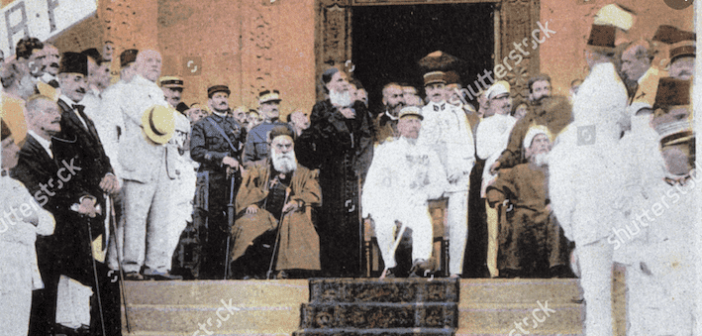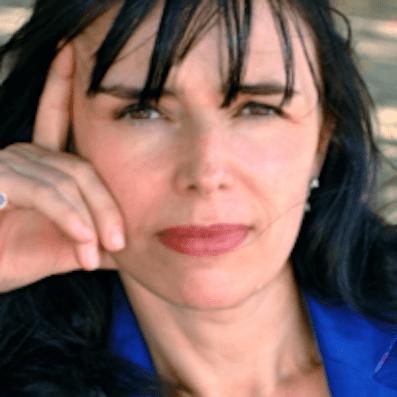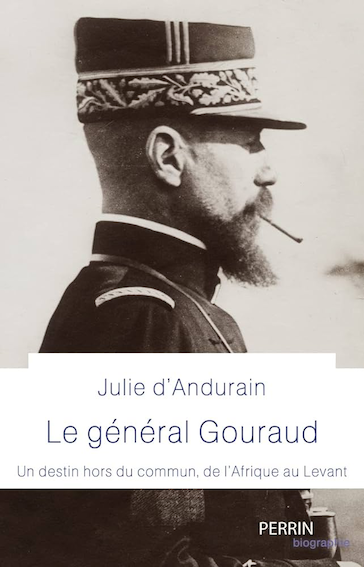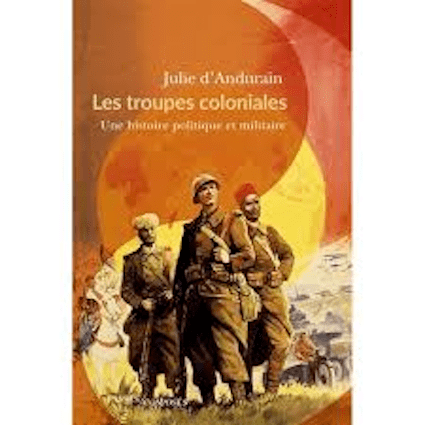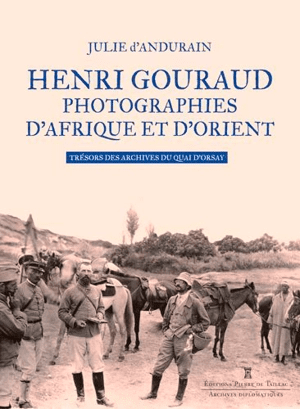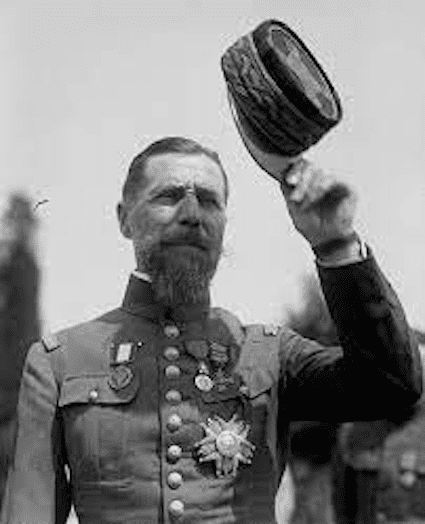|
إستماع
Getting your Trinity Audio player ready...
|
After studying history at the Sorbonne in Paris, Julie d’Andurain became a professor of contemporary history at the University of Lorraine in Metz. She specializes in issues of war and colonization, and has published several books, including a biography of General Henri Gouraud, titled Le Général Gouraud: Un Destin Hors du Commun, de l’Afrique au Levant (Perrin 2022), as well as a comprehensive overview of France’s colonial forces in the 19th and 20th centuries, titled Les Troupes Coloniales: Une Histoire Politique et Militaire (Passés Composés, 2024). Diwan interviewed Julie d’Andurain in late March, to discuss her biography of Gouraud, especially the period when he was France’s high commissioner in Lebanon and Syria.
Michael Young: You’ve written a biography of General Henri Gouraud, the man who, among other things, declared the establishment of Greater Lebanon on September 1, 1920. Why did you decide to write about him?
Julie d’Andurain: I had a personal history that tied me to the Orient, to Syria and Lebanon, as my family lived in Palmyra and Beirut in the 1930s. After an initial academic research project on my grandmother, Marga d’Andurain (Marga d’Andurain 1893–1948: Une Passion Pour l’Orient, Le Mari Passeport, Maisonneuve & Larose, Nouvelles Editions 2019), I wanted to continue working on the region, but to do so using archives, because I wanted to train as a historian.
I am indebted to a curator at the Quai d’Orsay, Pierre Fournié, for having introduced me to the Gouraud collection in around 2000. I discovered that Henri Gouraud (1867–1947) had had a very varied career, from Africa to the Middle East, via World War I. The Gouraud collection was an exceptional archival fund, truly out of the ordinary (over 500 boxes of archives). For a young woman who wanted to “do history” at university, it was an extraordinary opportunity. I was about to meet an unknown world—the army—and a man who was equally unknown to me. I saw my new research work as a leap into something new, as a very interesting intellectual adventure. All I knew was that Gouraud had contributed to the formation of Syria and Lebanon just before the Mandate period. Then, my doctoral research work led me to want to understand his professional trajectory in its entirety.
MY: Can you outline the characteristics of the new colonial approach that emerged in the late 19th century—one can almost call it a “softer” form of colonialism—of which Gouraud became a practitioner? How did this change affect his career?
JA: Gouraud was indeed the representative of a form of colonialism that sought to give itself a human face around the 1920s, when the term “colonial humanism” was coined in France. His theories stemmed from his apprenticeship with Marshal Hubert Lyautey in Morocco before World War I, but also from the realization that colonialism could not be reduced to simple domination. He understood this early in his career, around 1900. At that time, he became close to the “indigénophiles,” both political and military, who wanted to change the way colonialism was carried out. It was also a perfect response to the demands of French politicians moving in this direction. The Mandate system that followed World War I was a lesser form of legal guardianship than the system of Protectorates that had been in place prior to that, itself less overbearing than the system of colonies prevailing earlier.
MY: What, in Gouraud’s career as a colonial officer, made the French authorities pick him to be France’s representative in the Levant and commander of its army there, before being appointed the first high commissioner to Syria and Lebanon?
JA: Gouraud was chosen by prime minister Georges Clemenceau, on the strong advice of the so-called “colonial lobby.” He was recommended because, on the one hand, he was a colonial officer with knowledge of Africa and the Arab world (he had served in Morocco under Lyautey between 1912 and 1914). On the other hand, by the end of World War I, he was such an important war leader that consideration was given to making him a field marshal. To talk to the British supreme commander in Syria, Edmund Allenby, France needed an officer of comparable stature. Few of Gouraud’s comrades could claim to have such authority, let alone his qualities. He was also an efficient general and very obedient to the political authorities, therefore someone in whom the political authorities—Clemenceau in particular—had confidence. Last but not least, Gouraud was a Catholic. As such, he was able to appeal to the Maronites in Lebanon, even if he was also keen to please the Muslims, for whom he expressed great respect from the outset. His spiritual tendencies also enabled him to grasp the complexities of the Middle East, and set him apart from the secular officers or Freemasons in the military who were hostile to all religions.
MY: In your book, you make it clear that France’s efforts to establish a Mandate in Syria (less so in Lebanon) was much more difficult than historical accounts suggest. What were the main political and administrative issues that preoccupied Gouraud and the French authorities in 1920–1922 with regard to Syria and Lebanon?
JA: Yes indeed, the story of the French presence in the Middle East is, like all colonial narratives, watered-down. We also too often and too quickly forget the chronology of events that explains how decisions were taken. Gouraud himself was very discreet in his memoirs about Franco-British rivalries upon his arrival in the region. In his private letters, when he communicated with his officers, it was clear that the tensions with Britain were very high, but Gouraud, who was a gentleman, managed to be conciliatory with Allenby. Furthermore, even if my comments sometimes offend the Lebanese today, the archives show that the relationship with the Maronites was not invariably harmonious. Gouraud was under pressure from the Maronite patriarch Elias Boutros Howayek and the Lebanese, while also seeking a balance between Amir Faisal’s Arab supporters and the Lebanese (it should not be forgotten that he had been appointed in the East in order to install Faisal on the Syrian throne). Finally, Gouraud came up against Faisal’s entourage, made up of Arab nationalists, who had absolutely no confidence in France’s decisions.
Basically, at the outset, Gouraud and Faisal were both committed to dialogue. Then, little by little, their relationship deteriorated as extremist attitudes on both sides polarized the atmosphere between them. Both men were overtaken by the most radical positions expressed in their entourages.
MY: One of the things you stress is that neither Gouraud nor the secretary general of the High Commission in Beirut, Robert de Caix, intended to implement a policy of divide and conquer in Syria, by creating a federal system. What makes you say this, and if you’re correct what actually motivated their thinking?
JA: “Divide et impera,” or divide and conquer, is a strategic concept that dates back to Antiquity. The idea is to sow discord among local opposition groups in order to impose an outside force. It’s a tactic of warfare like any other, based on cunning. But even if it was used during colonial wars, it’s not an unequivocal strategy. It was not systematically applied by colonial officers, since it depended very much on context.
In the Syria and Lebanon, Gouraud and Robert de Caix did not apply it as has been too often repeated. They arrived in the Levant with the idea of creating a “Greater Syria,” a nation-state as vast as possible—encompassing Syria, Lebanon, Cilicia, and parts of Palestine. Their reasoning was based on their nationalist conceptions and the idea that a state must be as vast as possible to resist its neighbors. In this case, Gouraud wanted a strong and powerful Syria, capable of resisting the Turkey that was being created before his very eyes, under the aegis of Mustapha Kemal. This point seemed absolutely central to him, and guided his thinking on the organization of the Syrian state. Robert de Caix, his deputy, shared his point of view. But in the process of setting up “Greater Syria,” they both noted the tensions this had created: Aleppo didn’t want Damascus to dominate; Damascus didn’t want Beirut as its capital; Beirut didn’t want to pay for the Syrians. Local tensions were expressed in broad daylight. Therefore, Gouraud and Robert de Caix thought it would be wise to propose a federal model. They were inspired by the American model—whereby a “United States of Syria” would unite all the states in the region under the French banner. Their proposal was far more pragmatic than cynical or strategic.
It was also perfectly in line with the expectations of the fledgling League of Nations, which supported the concept expressed by then U.S. president Woodrow Wilson of national self-determination. Basically, the federal project they both proposed was simply an effort to adapt to the tensions of the moment. It was a policy profoundly based on what was possible, as opposed to what was desirable.
MY: As you finished your biography, what were the main conclusions you reached about Gouraud. Did your research compel you to reconsider your initial impressions of the man?
JA: As I said at the start of the interview, I had no preconceived ideas when I began my research, since I knew nothing about the colonial world or Gouraud. Like everyone else, however, I didn’t have a very positive image of colonialism, nor of colonialists. I knew that it was an exercise in domination or war, or both, without really knowing how it was waged.
Today, I think I have a more nuanced and broader view of colonialism. It is indeed an exercise in territorial occupation and domination, originally founded on the discovery of the world. Nothing could be clearer. However, these territorial occupations have not always been violent or warlike. In some cases, they were achieved by negotiation, in others by cunning, and in yet others the arrival of the French (or the English, or others) may have met with the approval of certain populations who saw colonialism as a means of developing their territories and gaining access to progress and modernity.
The work of historians is far from over. We still have a lot to learn about colonial campaigns and how they evolved over time. Even if there are obvious similarities between the conquests of Algeria in 1830 and the uprising in Syria in 1925, we can’t compare different periods and necessarily consider that everything is the same. The succession of legal systems—colony, Protectorate, Mandate—clearly shows that colonialism never ceased to be contested or negotiated by local elites. They did not reject contact with the West, but they did not want to be absorbed by it either.
As for Gouraud himself, I was able to discover a world that was totally novel to me thanks to his archives, both professional and private. Cross-referencing professional and private sources is invaluable for understanding a man and his career, but also for distinguishing between the two. I realized that he corresponded to a type of officer that no longer exists in France. He belonged to the category of the great discoverers, men who agreed to leave their comfortable lives to discover the world first, then to conquer it by putting themselves at the service of their country, which enabled him to have, as they say, une “belle carrière,” or a “fine career.”
Some might criticize Gouraud’s personal choice. But what really surprised me about the general and his comrades was how these men went off into the distance without knowing whether they would come back alive. First and foremost, they were adventurers, strong-willed individuals who were curious about the world around them and willing to sacrifice their lives to discover it.

